Sheldon Keefe joined Leafs Lunch on Tuesday afternoon to discuss how he’s staying productive during the suspended season, how he is preparing for if and when the season resumes, Nick Robertson’s emergence as a high-end prospect, and the signing of Alexander Barabanov out of the KHL.
Confirm or deny — you do not have a Netflix account?
Keefe: Wow, leading with that. I do not have one. I feel like it is a rabbit hole of entertainment that I just don’t quite need. I’ve got a lot of other things I need to spend my time on — my family being one, of course, and the Toronto Maple Leafs being one. It’s not that I don’t have other avenues for entertainment. I love to watch movies and I am kind of an old-school iTunes guy. I have all that I need. I am catching up on seasons that I am well behind on. That’s probably all that I need.
This is the first time in a long time that you’re at home consistently in March and April. What has that been like keeping everyone happy and healthy and safe in the Keefe household?
Keefe: Like everyone with kids, we’ve gone through all the different emotions that come with it. The overriding one for me is that it is such a great opportunity to be around my kids and really learn about my kids in so many different ways that you don’t really get exposed to. Even in the offseason, when you are around your family a lot, you are always on the run a lot when they are playing sports or with their friends — going to this party or that party, hanging out here or there.
When you are in it together all day every day, and when I came on I heard discussions about schooling, it is a whole other area. Now I am seeing how my children learn and seeing where they are at. I am really working very closely with them. Schools have done a terrific job of communicating different things they should be working at. Working through that with them has been a great learning experience for me and it is a great opportunity to connect with my kids on a different level.
I said to someone the other day that through this, the one thing that hasn’t happened is that my kids haven’t asked if I am going to be there tomorrow, which is generally a question I get when you are traveling as much as you are. Everyone is going through a lot and has their own experiences with it, but like everything that happens, it is important to find the positive side of it.
How would you describe the way this year has gone for you? Kyle Dubas said last week that he was excited for you to get a full training camp under your belt as head coach. With the ebbs and flows of the year and now with the NHL on pause, how has this personally affected you from a coaching perspective, being a first-time coach in the NHL?
Keefe: It’s a good question. It has been a very eventful hockey season. This year for me has been an eventful one with a lot of teams and a lot of things happening. Going through what we are going through now is a big change for everybody in the world. My focus has been on just trying to use this time productively. Any time that you come in mid-season, it’s like jumping on a treadmill that is flying and you are trying to catch up and keep up with the pace. I think we were able to do that through my time there. I had great support from the staff to do so.
There are so many things that you know are important that you really want to be able to do, or things that you want to adjust to or discuss. It is really difficult to do at times in the setting of a season. I think there are key times. We came back from the All-Star break and it was a bit of a reset for us and a chance to discuss different things. But that training camp setting is an opportunity to really start things at the ground floor. What is most important to you is the team as the coach and you really build out from there. It is difficult to do that in-season. You really just feel like you are trying to plug holes and work on the fly.
That type of an opportunity is one that every coach looks forward to. For me, this is a really unique situation, of course. We may come back and resume the 2019-20 season and I’ve had that opportunity to really reflect, slow down, and prioritize what we want to be about and how we can really… not start over, of course, because there so many things where you are already down the path and the team is established and the players are established, but it is a good chance for us to reset and re-prioritize things.
Let’s say you see something on tape as you’re watching tape. You want to drastically change a breakout or how you kill a penalty. Are you making sure the guys are seeing the same tape so that when you show up, it’s not like you are actually resetting so that once you get rolling, you can just implement whatever it is you want to implement?
Keefe: That is our intention — when we come back, we want to be better versions of ourselves, both individually and collectively. It is difficult to do that from a physical standpoint. The players are doing what they can to stay in shape and get their workouts in, but they can’t get on the ice. It is not normal for them. Physically, it is difficult to ask our players to be in a better spot. We want them to be in as good of a spot as possible and our staff is doing a great job, between medical and training and strength and conditioning staffs, of monitoring that and helping our players through that.
As coaches, we want to identify things that are most important and utilize this time to kind of close that gap. We want to give our players their space similar to what they would have in an offseason type of setting, but our players are very committed to wanting to get better and know we need to get better. It’s not something where we are regularly throwing things at them, but we are really working towards building a plan where we are going to be able to deliver information to the players so that by the time we do come back to play, it hasn’t been just a time of silence where they haven’t heard or seen anything. We are hoping to make some progress and have conversations with players that will help us get closer to what we want to be as a team, and not necessarily have to start anew by addressing what we need to address.
How might that apply to scouting other teams? If we come back in three months and it’s decided you’re playing the playoffs and you’re playing Tampa tonight, are you studying Tampa, and if so, are you sending those notes and messages to the players and expecting they would be up to date as well?
Keefe: We are working on a lot of different things as a staff. Different opponents and learning from different teams around the league — and not just teams for when we might come back, but also just learning from across the league as a whole. That is part of what we are doing. We are trying to really learn about our individuals and really break down their games and have a very clear profile of each one, where they are at, and where we would like them to be.
We are trying to be as organized as possible in terms of what we decide to deliver to the players. We are going to wait for more information based on if timelines become a little bit more clear and if the situation in terms of the format of who we might play becomes more available. We’ll deal with that accordingly. We don’t want to throw too much at the players unnecessarily and lead them down the wrong path.
As more information comes our way, we will be able to make more decisions in that sense, but we need to be prepared for everything. As a coaching staff, that is our job.
So you’re not sitting and sending text messages at 3 a.m. like a mad scientist?
Keefe: One of the first things you do when you come in as a coach is establish relationships with the players. That is very much a work in progress for me, and again something that is compromised by the schedule and the fact that you are preparing to play all the time. You’re trying to learn about your coaching staff and you’re trying to learn the league. You are balancing so many things, but those relationships, now that you aren’t seeing each other every day, are more challenging.
I’m trying to stay in contact as much as I can whether it’s through phone calls or text messages or e-mails. I’m trying to do that piece, but I’m also trying to respect their space. Everyone has their own stuff going on. As I already mentioned, there are a lot of members of our staff that are keeping constant contact with players about what they need and what they are going through and how they are feeling. They are getting a lot of people reaching out to them. You see more of a presence from the players in the media and on social media putting themselves out there. It is important as coaches that we recognize our role and to not overdo it, but within that, we know we have a role to play to make sure we come back as better versions of ourselves.
We are doing a lot of the work right now as coaches to get us as prepared as possible. When the time is appropriate, we will make sure we deliver the information to the players.
We know that the Leafs made some news today by signing Alexander Barabanov out of the KHL. Where do you see him fitting into the lineup? And what would you need to see from Nick Robertson for him to make the leap to the NHL? Based on his age, he wouldn’t be able to go to the Marlies. It’s either NHL or back to the OHL. What are you looking for from those two players?
Keefe: I think it is important for me to say that it is a strange question for me to answer because we are not done the 2019-20 season. To be talking about players that might help in the 2020-21 season is a difficult question for me to answer because there are so many things that need to happen between now and then.
Robertson’s situation — clearly, he identified himself and got the notice of the hockey world with the type of season that he had. He is kind of making it obvious that he is a player to be taken very seriously and is going to be a very important piece of the organization. I think he really started to do that for me in the rookie tournament. I was behind the bench and coaching the Leafs rookies in Traverse City, and right from the very first game, it was clear to me it was a player on a mission.
As a coach and an organization, those are the players that you are just drawn to because they are difference makers. They are guys that aren’t comfortable. They aren’t entitled to anything. They are going out there and controlling only what they can control, which is their performance. It seems like with every stride Nick Robertson takes, he is trying to send a message and make it obvious he is there to make a difference. That stood out to me as a coach. That continued all the way through Leafs training camp.
To a man — even in my role with the Marlies, you are in Leafs circles with the coaches and management and in the meetings — everybody recognized how great of a training camp he had and how terrific he was. He continued that mindset of making a difference with every stride he took and every puck that he shot. But it was very clear he needed to go back to junior and that, ultimately, was what was going to happen. There were so many decisions to be made at the NHL level with the NHL players that the decision was made to focus on them. Ultimately, that was the right decision for him to go to junior and do his thing. He certainly did that with an exclamation point.
He is a guy that we are really, really excited about. With him, you are balancing the development side of it and what is right for him. He can’t play for the Marlies. The NHL level is about performance and how the team can play its best and have its most success. It is a challenge to balance that with a young player with what is right for them. Those decisions remain to be seen, but clearly he is a guy to be excited about.
With Barabanov, what is it about your organization that is leading to these players deciding to sign here?
Keefe: The common denominator, first of all, is Jim Paliafito and the work that he does to identify the players that are going to be a fit for our organization and then put in the time to build relationships with the players and make them understand why Toronto might be a fit. That is really where it begins. Jim Paliafito has really lead the way in the time that he invests to be over there in Russia following players and tracking them and building those relationships. It is really, really incredible the sacrifices that he makes for the benefit of the organization. That is where it starts.
The reality of it, though, is that can only get so far. That gets you one player, but you can’t really get the next player unless you take care of the ones that come into the organization. Word spreads. People talk. A lot of these players are represented by the same agency with Dan Milstein. These types of things are so important — that you take care of the players when they arrive. I think the Leafs have done a terrific job of that with the players over the years. Certainly, I saw it this year with Mikheyev with the Leafs this year and how they took care of him and helped him with the transition. All of that is a big part of it.
As the players themselves come in and have success, more and more players want to be a part of that. We are fortunate that those things fell in line for us. Barabanov is a player we are excited about.


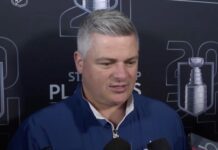
![Sheldon Keefe on the Maple Leafs’ struggling power play: “[We’ve scored] one out of 11 high-danger chances in tight to the net… We have been in those spots and haven’t converted” Sheldon Keefe, playoff press conference](https://mapleleafshotstove.com/wp-content/uploads/2024/04/keefe-pc-game-3-218x150.jpg)
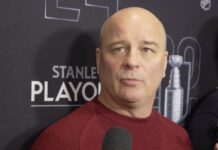
![Jim Montgomery Post Game, Bruins 4 vs. Leafs 2: “[Marchand] still manages to get under people’s skin, yet he doesn’t cross the line” Jim Montgomery, Boston Bruins post game](https://mapleleafshotstove.com/wp-content/uploads/2024/04/jim-monty-pg-to-218x150.jpg)





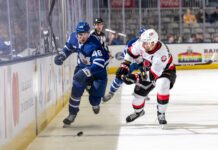













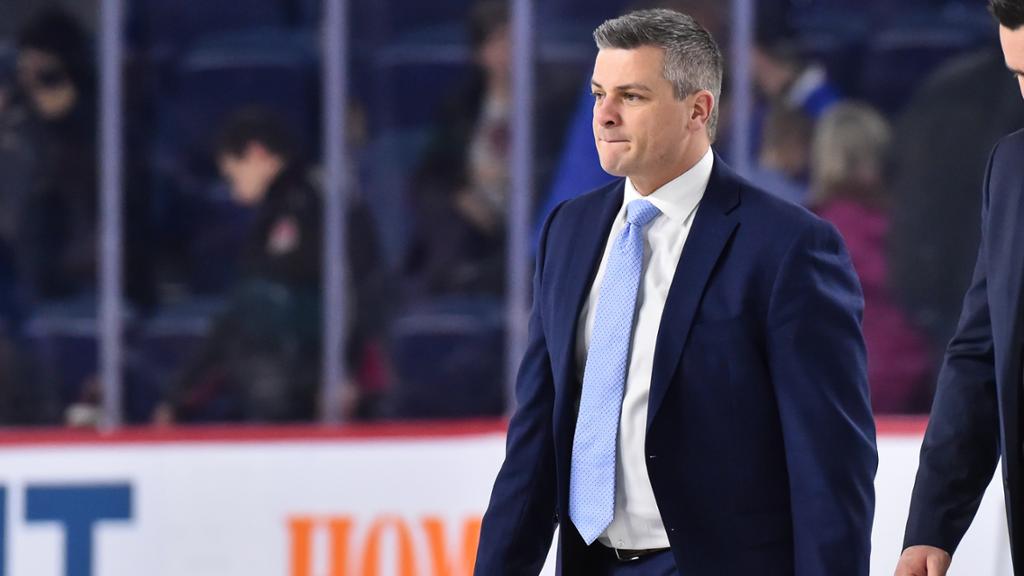
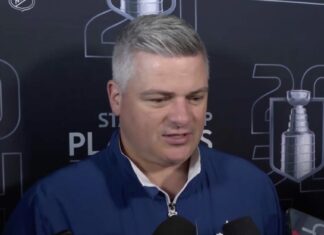



![Sheldon Keefe on the Maple Leafs’ struggling power play: “[We’ve scored] one out of 11 high-danger chances in tight to the net… We have been in those spots and haven’t converted” Sheldon Keefe, playoff press conference](https://mapleleafshotstove.com/wp-content/uploads/2024/04/keefe-pc-game-3-100x70.jpg)



![Jim Montgomery Post Game, Bruins 4 vs. Leafs 2: “[Marchand] still manages to get under people’s skin, yet he doesn’t cross the line” Jim Montgomery, Boston Bruins post game](https://mapleleafshotstove.com/wp-content/uploads/2024/04/jim-monty-pg-to-100x70.jpg)
